State of RSS survey - The results
We want to thank everyone who participated in the State of RSS survey (2020 edition). It means so much to us that so many of you are willing to take some of your precious time to help us out.
The survey was open for 4 weeks and more than 800 people participated. The total time that was spent answering our questions equals 7 working days. That’s a lot of choices made.
Let’s go through some of the answers we found the most interesting. At the end we'll share how you can download the data and reach your own conclusions.
Demographics
The respondents were geographically diverse. The largest chunk was from the USA (23%), and from countries with english as the native language. (37%)
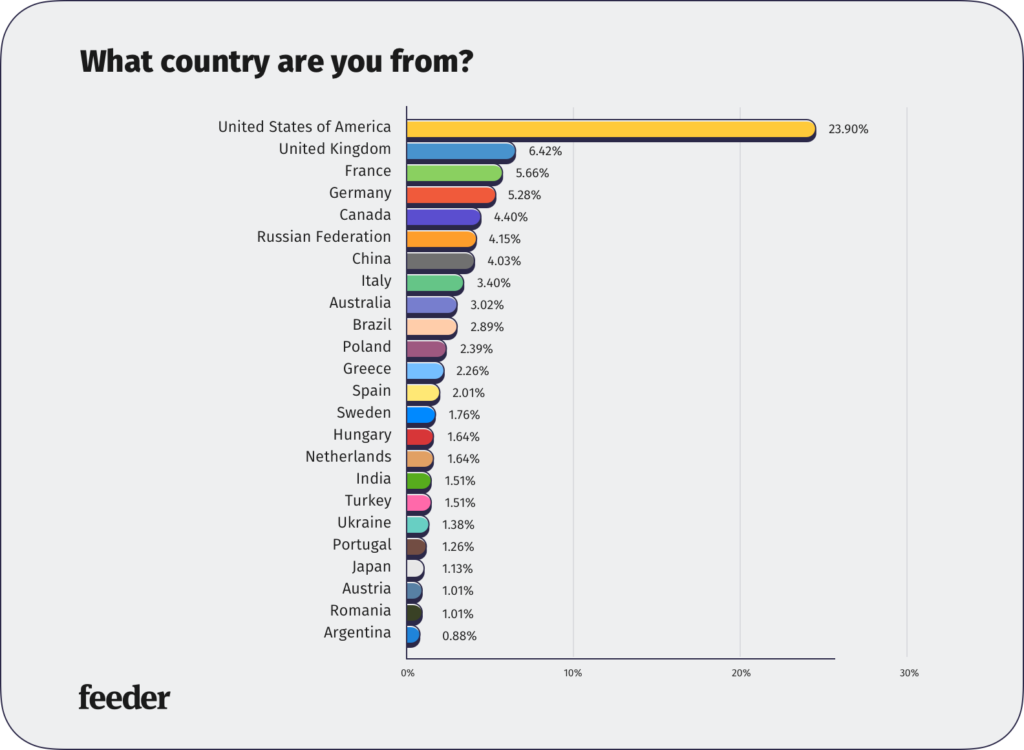
Age
Average age was 38 (median was 35).
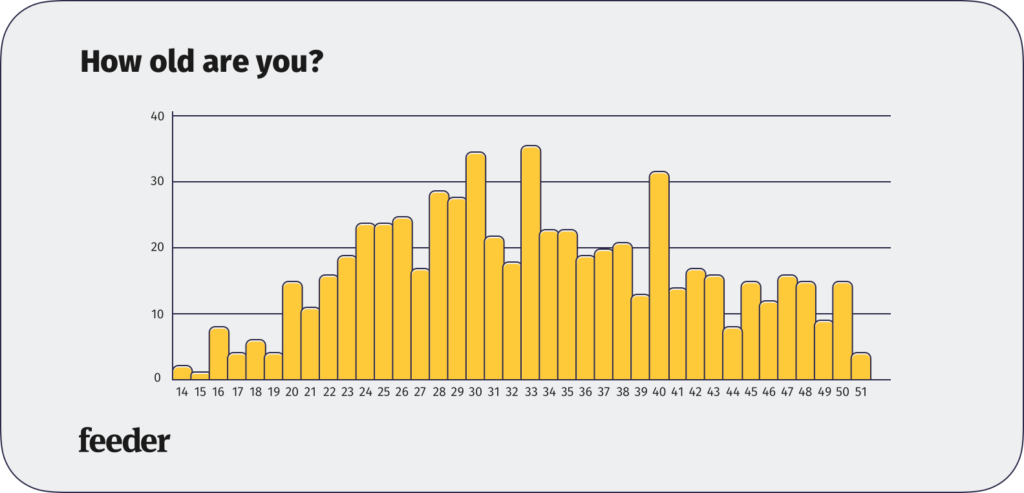
Gender
The respondents consisted of 82% males, 11% females, 2% genderqueer/non-binary/agender.
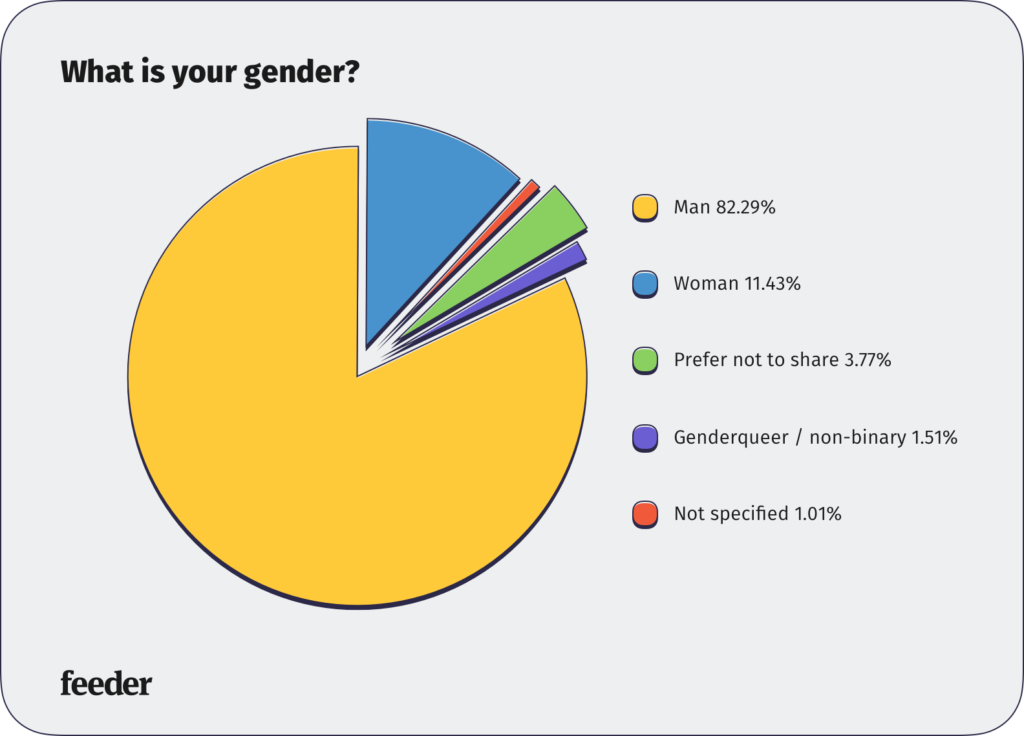
Education
The respondents were a well educated bunch! Only 10% having a high school diploma or “less”.
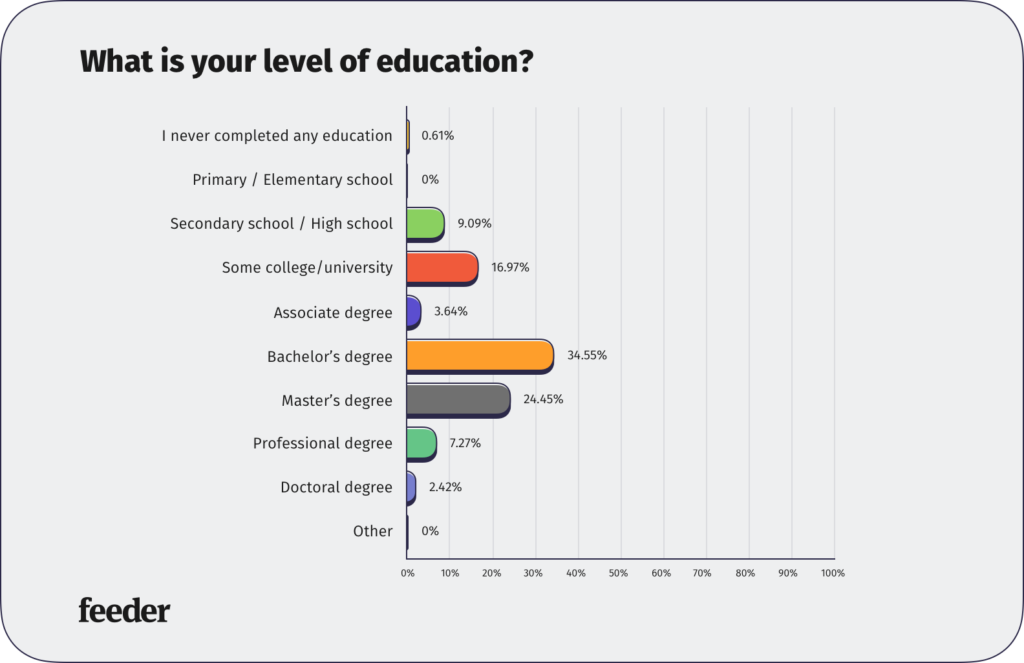
Occupation
The largest occupation by group was tech- or engineering-related. However, there was a definite long tail of occupations. We weren't surprised by tech being the largest segment, but happy to see that there were many other occuptions finding use from RSS feeds.
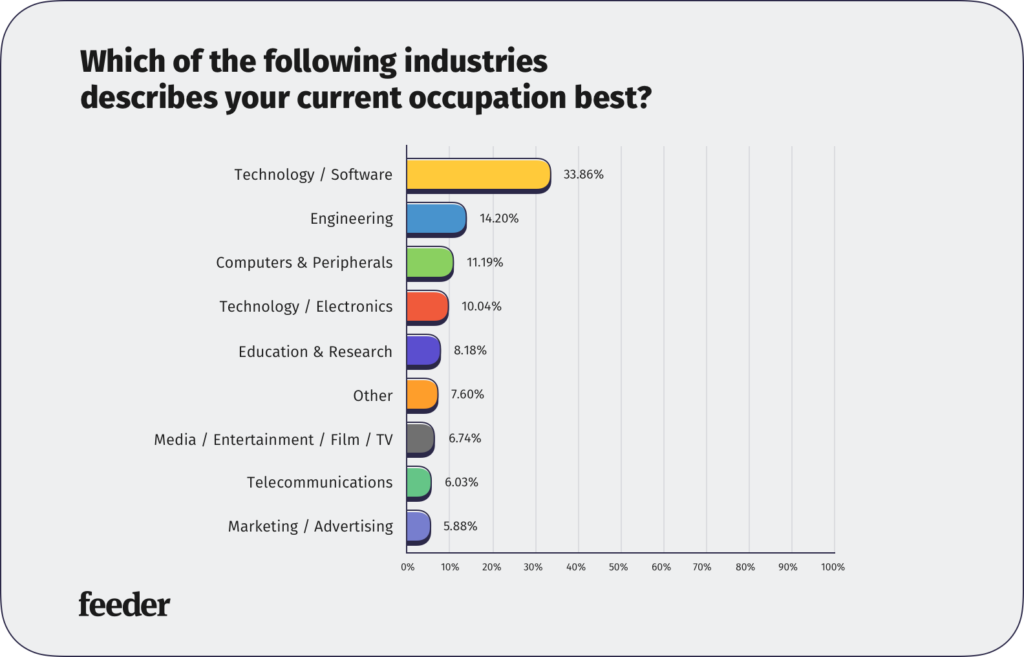
About 80% considered themselves to be above average in “tech savviness”. What’s interesting is that women generally rated themselves lower than their male counterparts. It validates the existence of a confidence gap.
RSS readers have historically been quite difficult to get into. It's difficult to explain to a "non-techie" what an RSS feed is, and also a lot of the available readers cater heavily to that audience.
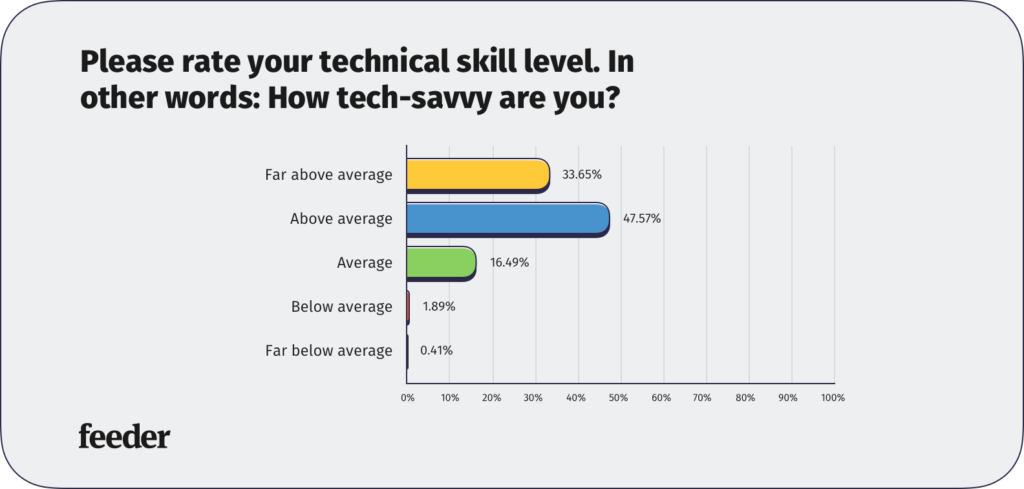
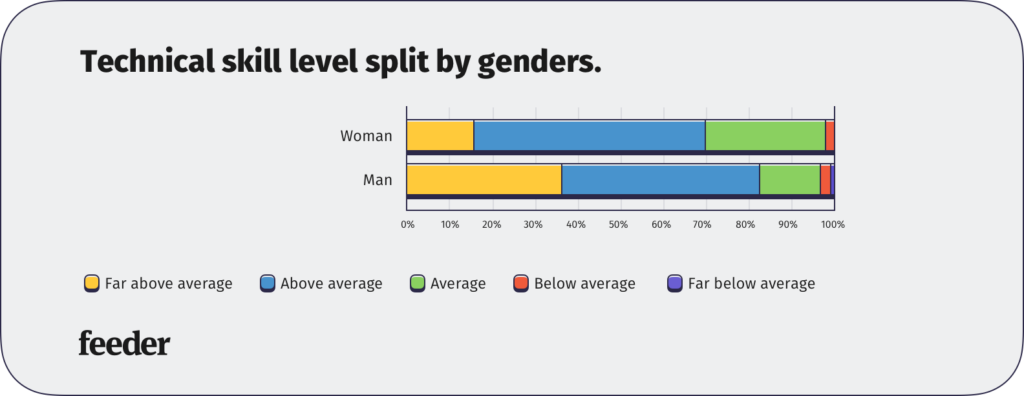
Usage
What surprised us a lot was that over 61% started using RSS more than 5 years ago, and only 10% within the last 1 year, and by far the largest group (37%) was more than 10 years ago. For us this shows that the stickiness of RSS readers is insane! There are very few social networks with this level of retention.
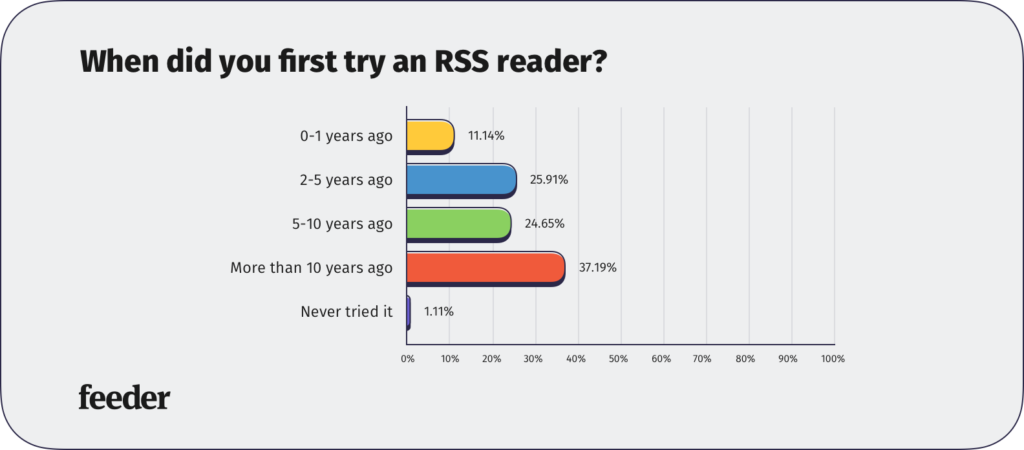
RSS readers are an important part of your daily routine, with over 75% using one daily.
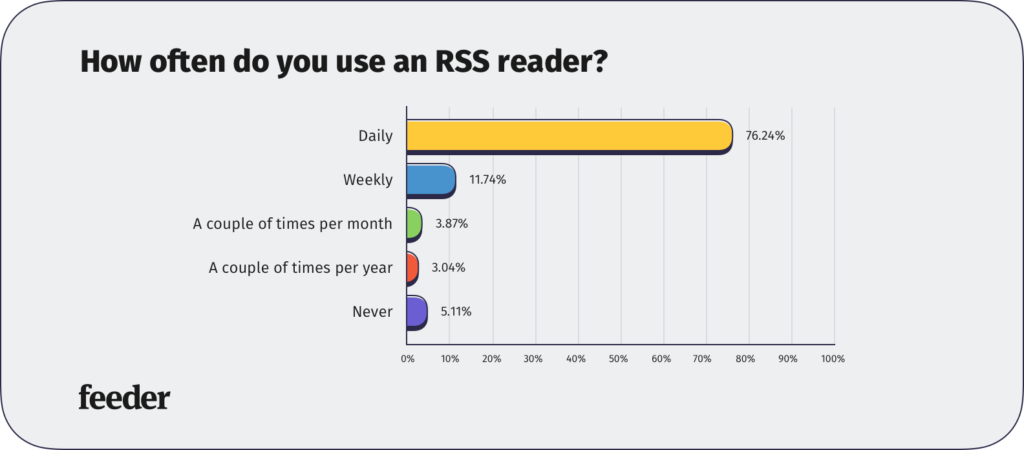
We asked how people stay updated about various topics, like family/friends, hobbies or work news. One fact that stood out to us was that Youtube stands for almost 60% of all hobby-related news.
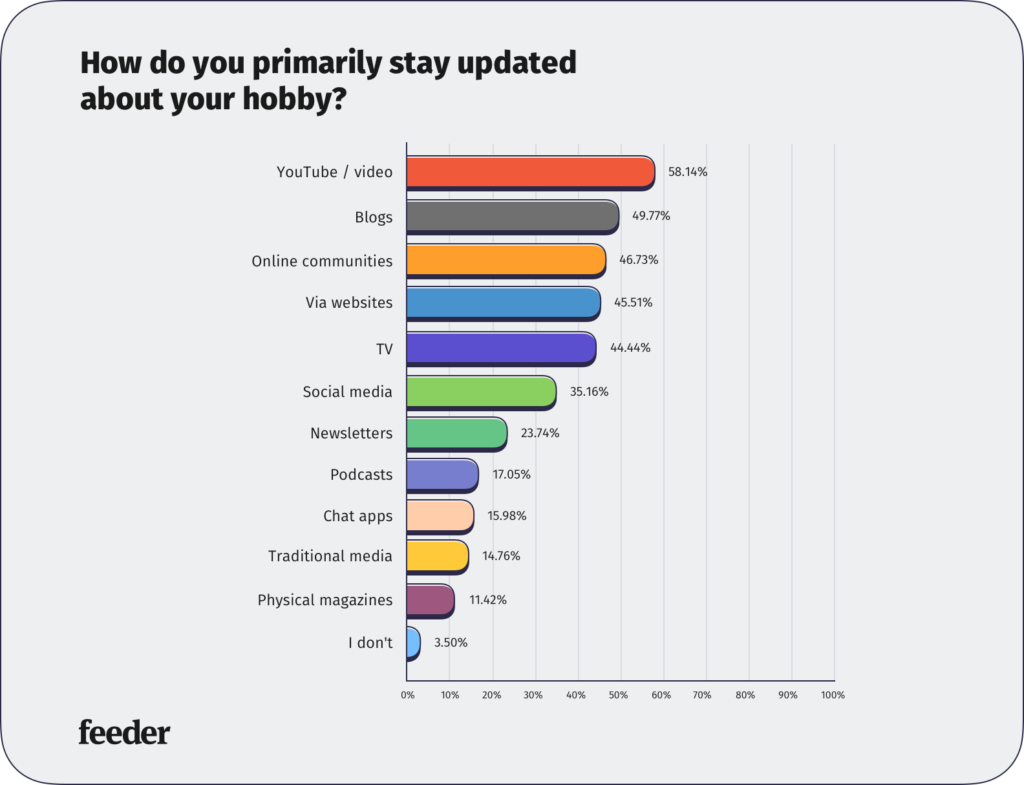
A conclusion here is that YouTube is really a major media outlet, taking the role of Discovery channel or Mr Rogers, or most types of TV entertainment for that matter.
Looking at our own behaviour, YouTube has become the place we visit to learn new things. Cooking, self-education. Just search for “How to do X” and you’ll find a breadth of great videos. Once you're sucked in, YouTube's amazing recommendation engine takes you for an endless ride.
For global and local news, the traditional media and news websites are still very important. Social media is also very important. Given the rise of fake news and social media manipulation, this could be a worrying trend.
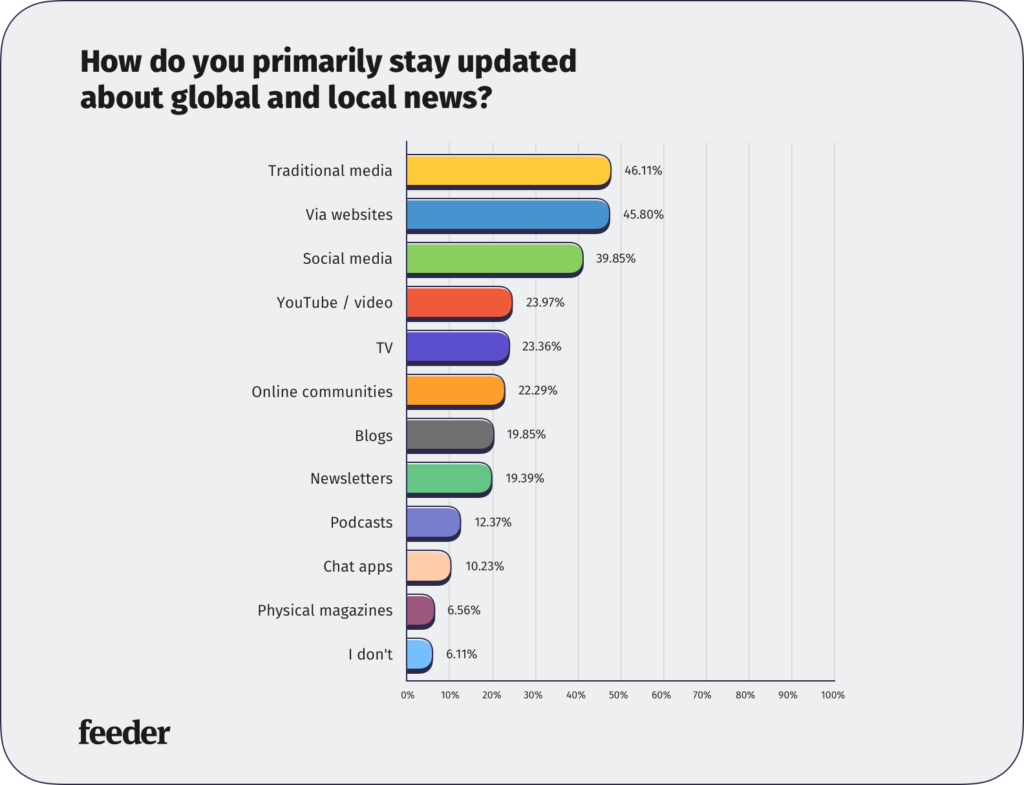
Here it’s also interesting to measure the gender differences in these questions. For any given question, women reported using social media between 50% and 100% more than their male counterparts!
Features
We asked the respondents which features of their RSS reader were most important. In the below table we simply sorted the features by the number of positive responses.
| % positive | Feature |
|---|---|
| 68.57% | Unlimited sources to follow |
| 67.48% | Keeping count of unread posts |
| 69.26% | No tracking/privacy-minded |
| 61.00% | Follow sites that don't have RSS feeds |
| 59.09% | Organizing feeds into folders/tags |
| 58.63% | Saving posts for later |
| 58.39% | Mark out feeds that are no longer working |
| 53.52% | Updates as soon as they happen (real time) |
| 43.74% | Notifications |
| 42.19% | Software is open source |
| 40.29% | Save webpages/bookmarks |
| 38.51% | Full article extraction |
| 38.35% | Offline reading |
| 37.58% | Filter/mute irrelevant content |
| 36.78% | Search my post history |
| 36.53% | Filter for only relevant content |
| 36.31% | Export my feeds as RSS |
| 34.68% | Doesn't require an account |
| 30.79% | Good user manual/documentation |
One thing that really struck us was that “No tracking/privacy minded” came third! Comparing this to the features based on the % of respondents who felt it was “Most important”.
| Percent | Answer | Feature |
|---|---|---|
| 36.00% | Most important | No tracking/privacy-minded |
| 35.31% | Most important | Unlimited sources to follow |
| 29.34% | Most important | Organizing feeds into folders/tags |
| 28.46% | Most important | Keeping count of unread posts |
| 27.57% | Most important | Updates as soon as they happen (real time) |
| 27.39% | Most important | Follow sites that don't have RSS feeds |
| 21.00% | Most important | Saving posts for later |
| 20.29% | Most important | Mark out feeds that are no longer working |
| 19.30% | Most important | Notifications |
| 18.72% | Most important | Doesn't require an account |
| 18.35% | Most important | Software is open source |
| 16.35% | Most important | Export my feeds as RSS |
| 16.20% | Most important | Circumvent censorship in my country |
| 15.74% | Most important | Full article extraction |
| 14.41% | Most important | Save webpages/bookmarks |
| 13.22% | Most important | Search my post history |
| 12.50% | Most important | Offline reading |
| 12.32% | Most important | Filter/mute irrelevant content |
| 11.48% | Most important | Filter for only relevant content |
Privacy is number 1! Large tech companies and social media companies have taken a lot of heat recently for their privacy invasive behaviours. With that in mind it wasn't unexpected, however, it was surprising how universal it was. We’re certain that if we’d asked the same questions 10 or even 5 years ago, it would not have registered as high, or even at all.
The other most important features were the basics: keeping count of unread posts, organizing feeds and fast updates.
"Unlimited sources" also rated very highly. Today, there aren’t many free RSS readers that provide this. Checking feeds for updates and storing posts all adds up the server costs. In May we implemented a feed limit for our free users of 100, and that was after concluding that very few users actually have more. Still, it's important to be transparent about why the limits are in place.
Pricing
Here at Feeder we live and breathe RSS (It’s in our company name: Really Simple in Stockholm (RSS) Ltd!). But to breathe we need to eat, and food requires currency. That’s why the topic of pricing and payments is very important to us.
When asked if they had paid for an RSS reader, only 20% said yes. It might feel low at first glance, but remember that means the conversion rate is 20%! This is very high compared to the industry average of 1-2%. It's getting pretty close to the industry leader: Spotify who have a reported 25% conversion rate.
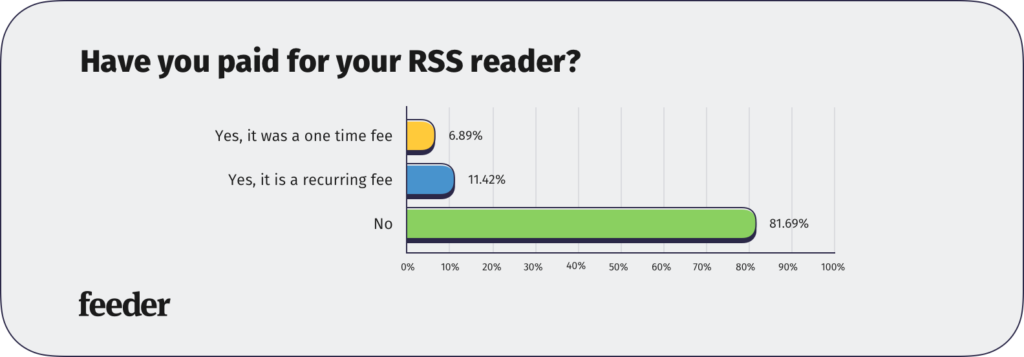
It was pleasantly surprising to see that loyalty ("I want to support the creators") was a very valid reason for paying.
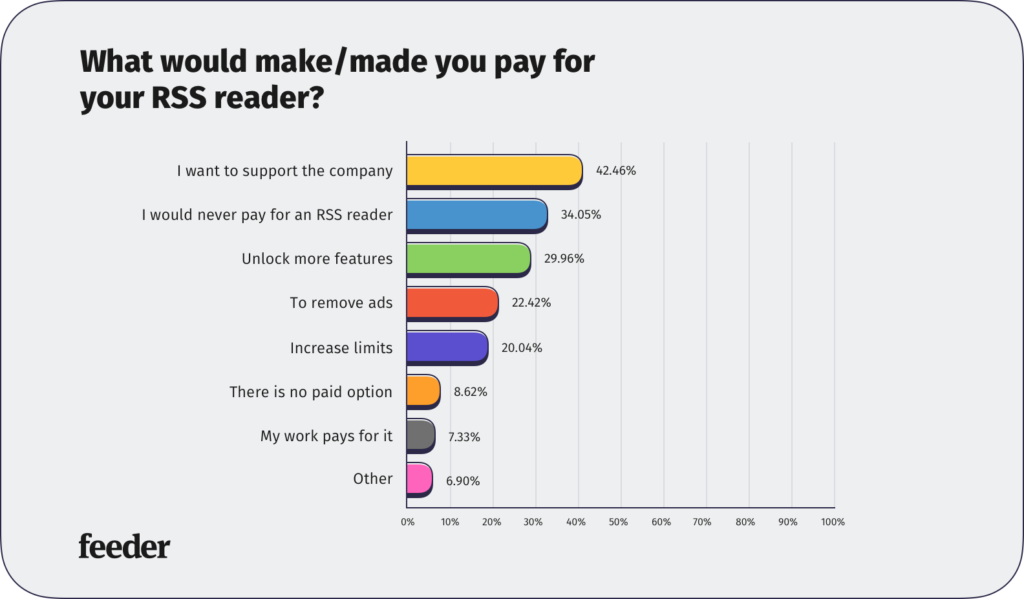
42% replied that they would pay for their RSS reader just to support the creators (And only 34% actually said a hard no to paying at all).
Privacy
90% ranked protecting their privacy as important or very important. The general discussions and news lately has really proven this. It was still surprising to see that it was top of mind for so many.
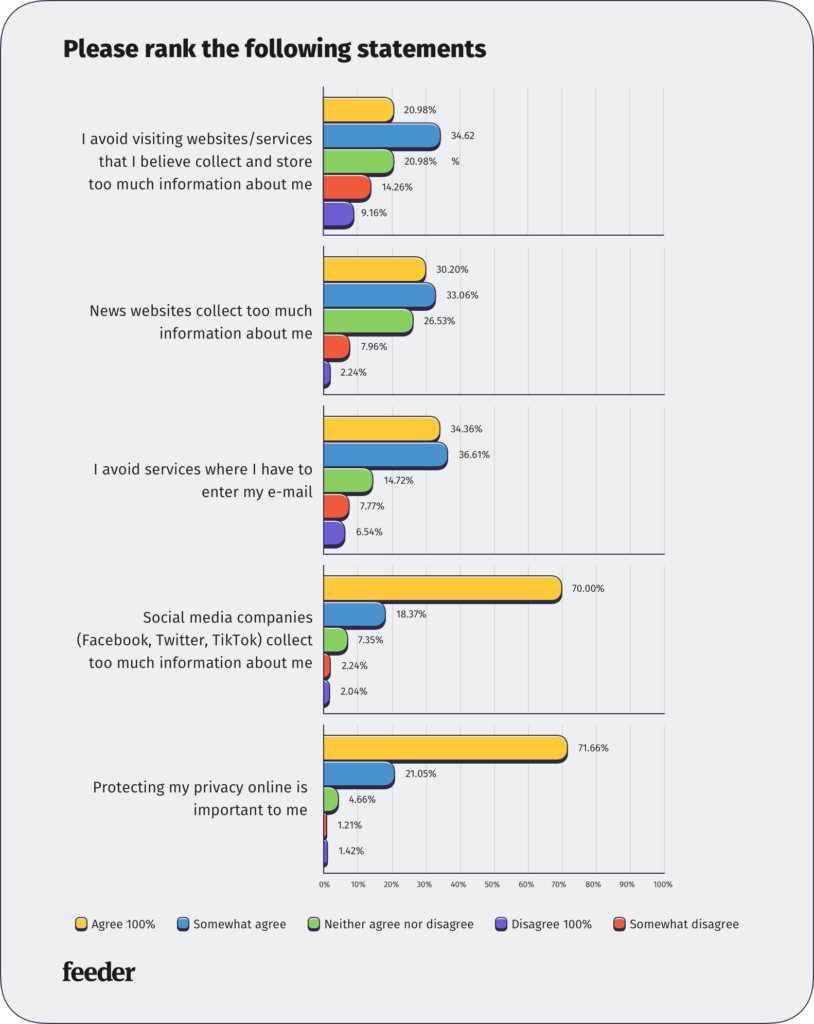
People’s faith in social media is definitely very low. Almost 90% responded that social media companies collect too much information. In contrast, only 63% felt the same way for news websites, which for the most part are ad-funded just like social media.
Feedback
At the end we asked for feedback so we can learn for next year’s survey. The most common feedback (35% who replied with feedback) said it was too long.
Too long
An eloquent respondent
We hear you! Next year’s survey we’ll be more concise. We promise.
We also received kind feedback and words of encouragement. Some even found it educational on the topic of RSS and RSS readers.
Liked it! The level of detail gave me a better idea of what other people are looking for in a feed reader, and helped me verbalize some of the stuff I'm looking for myself.
A kind respondent
Very good to have people still interested in RSS!
A great respondent
We also wanted to respect peoples responses, so we asked if we could include them in the open sourced responses. Over 90% generously replied with yes! We're so happy so many wanted to help the community.
In closing
Our mission is to make the internet more open. With this survey we hope to help the community grow and become stronger. We learned a lot and hope you did too!
You can find the responses on Github right here: github.com/feederco/state-of-rss. We’d love to have the community crunch the numbers and see if you come to the same conclusions as us. If you decide to write your own analysis, let us know at: support@feeder.co.
Cheers!